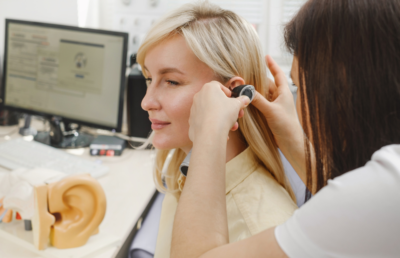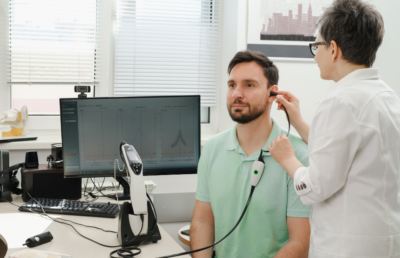Sensorineural hearing loss (SNHL) is hearing loss caused by damage to the auditory nerve or the structures found in the inner ear.
While this is not necessarily an emergency condition, it can, if left untreated, pose significant health risks and interfere with your comfort, ability to communicate, and your overall enjoyment of life.
Sensorineural hearing loss is incredibly common. Approximately 90% of hearing loss in adults is due to SNHL, making it an important condition to both understand and address.
Here are some of the causes of sensorineural hearing loss, its symptoms, and what can be done to address it.
What Causes Sensorineural Hearing Loss?
SNHL can occur as a result of damage to the cochlea or auditory nerve.
There are a few different things that can cause these types of damages. The most common causes of sensorineural hearing loss include:
Congenital Sensorineural Hearing Loss
In this instance, hearing loss is present from birth. This type of hearing loss affects about 1-3 babies per 1000 births.
Around half of babies born with congenital hearing loss develop the condition due to genetic factors. The other half develops the condition through environmental factors like lack of oxygen or infections, like toxoplasmosis, rubella, and herpes, passed from the mother to the baby.
Exposure to Loud Noises
Long-term exposure to sounds, 85 decibels or above, can cause SNHL. 85 decibels is equivalent to the sound of a food blender, hair dryer, or power lawn mower. Continued daily exposure to these noise levels can cause hearing loss.
One-time exposure to loud noises, like an explosion or a gunshot, can also lead to permanent hearing damage.
Presbycusis
Presbycusis is the name for age-related hearing loss. In the United States, 1 in 3 people between the ages of 65 and 74 experience hearing loss. Nearly half of the people over 75 experience some type of hearing loss.
While genetics, exposure to loud noises, and age-related factors are the most common causes of SNHL, there are several other, less common causes, like:
- Head trauma
- Infections like meningitis, mumps, scarlet fever, and measles
- Autoimmune inner ear disease
- Malformation of the inner ear
- Ménière’s disease
- Otosclerosis
- Tumor
What Are the Symptoms of Sensorineural Hearing Loss?
For most people, the symptoms of SNHL occur gradually, making them difficult to notice without a hearing test. In cases of sudden onset of SNHL, the symptoms will likely present in a matter of days and are often first noticed when waking.
Symptoms may occur in one or both ears, depending on the cause.
Symptoms of SNHL may include:
- Difficulty hearing when there is background noise
- Some sounds appearing to be overly loud in one ear
- Difficulty understanding the voices of females and children
- Trouble hearing high-pitched sounds
- Muffled sounds and voices
- Tinnitus or ringing in the ears
- Some etiologies are associated with dizziness or balance problems.
Sudden Sensorineural Hearing Loss (SSNHL)
Sudden sensorineural hearing loss can be a scary thing. It occurs when there is a loss of at least 30 decibels within 3 days. This hearing loss typically impacts only one ear.
It is important to understand that SSNHL may have a serious underlying cause. If you experience sudden deafness or hearing loss, see an audiologist or ENT as soon as possible, to help negate the effects and possibly restore hearing.
Sensorineural Hearing Loss Prognosis and Treatment
What a diagnosis of sensorineural hearing loss means can vary greatly depending on the extent of the loss and the causes.
SNHL can get worse over time, especially if the causes are age-related or genetic. If the cause is a loud environment or a sudden loud noise, the loss is likely to plateau if the cause is avoided.
There is currently no cure for sensorineural hearing loss.
The prognosis is slightly different in cases of sudden sensorineural hearing loss. 85% of people with SSNHL who receive treatment recover some of their hearing. Between 32%-65% of the people who experience SSNHL spontaneously recover their hearing within 2 weeks of the initial onset of symptoms.
The most common management strategy for SNHL is hearing devices. Modern hearing devices can be tailored to match specific needs, symptoms, and requirements. Hearing aids are just one part of management for sensorineural hearing loss. Counseling and consistent use of appropriate fit devices, show the most benefit from hearing devices.
Beyond hearing aids, interventions can include strategies and accommodations for daily living. Understanding how to advocate for yourself and communicate your needs to others is important. Similarly, assistive listening devices, and FM systems, a can be of significant help.
Living with hearing loss may require some adjustments but there is no reason it should interfere with a happy and healthy life.
Find Support for Sensorineural Hearing Loss at Chicago Hearing Services
If you think you may be experiencing sensorineural hearing loss, it is important to visit an audiologist for a hearing test.
At Chicago Hearing Services, we offer friendly, compassionate, personalized services that will address your specific needs. No two people experience hearing loss in the same way, and the support you receive should be just as unique.
We want you to continue living your best life. Contact us today to learn more!





